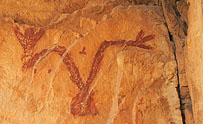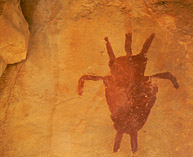|
Scenic USA - Arizona Snake Gulch |

| Photos by Rob Jones Rob's Trip Report |
Basketmakers have been placed  in America’s southwest as early as 1500 BCE. Over time, these nomadic hunters learned to grow squash, corn and beans, eventually settling into pit houses and rock shelters. Named for their basket making skills, some baskets were covered with clay and baked to make waterproof vessels. Today, we find the Hopi still making these traditional baskets for utilitarian and ceremonial purpose. One may notice slight variations in modern basket making techniques, however Hopi basketry hasn't strayed far from ancient styles and patterns.
in America’s southwest as early as 1500 BCE. Over time, these nomadic hunters learned to grow squash, corn and beans, eventually settling into pit houses and rock shelters. Named for their basket making skills, some baskets were covered with clay and baked to make waterproof vessels. Today, we find the Hopi still making these traditional baskets for utilitarian and ceremonial purpose. One may notice slight variations in modern basket making techniques, however Hopi basketry hasn't strayed far from ancient styles and patterns.  Covering an area of modern day Arizona, Utah, Colorado and New Mexico, a large assortment of remnants remain of these early cultures. Basketmakers were either replaced or absorbed by later ancestral Pueblo people, but evidence of their pottery, dwellings, granaries and rock art is found throughout the southwest.
Covering an area of modern day Arizona, Utah, Colorado and New Mexico, a large assortment of remnants remain of these early cultures. Basketmakers were either replaced or absorbed by later ancestral Pueblo people, but evidence of their pottery, dwellings, granaries and rock art is found throughout the southwest.
Near the North Rim of the Grand Canyon one can still view an amazing array of pictographs and petroglyphs that date back to the Basketmakers period. Following relatively level ground, the Snake  Gulch Trail offers miles of ancient rock art panels along the north and south walls. The majority of these pictographs are found tucked into shallow caves or alcoves on the north wall, varying from single works to broad panels. Now protected as a wilderness preserve, the ancient art work is very fragile and should never be touched. Viewing these works of art is part of an all day hike, and visitors are reminded to stay on existing trails as the desert soil is easily eroded. These pictograph panels are among some of the most impressive ancient rock art in the state, and a Snake Gulch adventure should be a memorable one.
Gulch Trail offers miles of ancient rock art panels along the north and south walls. The majority of these pictographs are found tucked into shallow caves or alcoves on the north wall, varying from single works to broad panels. Now protected as a wilderness preserve, the ancient art work is very fragile and should never be touched. Viewing these works of art is part of an all day hike, and visitors are reminded to stay on existing trails as the desert soil is easily eroded. These pictograph panels are among some of the most impressive ancient rock art in the state, and a Snake Gulch adventure should be a memorable one.
Area Map

|
Additional Points of Interest |
|
Copyright © 2020 Benjamin Prepelka
All Rights Reserved
